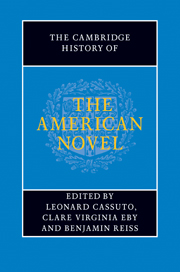Book contents
- Frontmatter
- General Introduction
- PART ONE INVENTING THE AMERICAN NOVEL
- PART TWO REALISM, PROTEST, ACCOMMODATION
- Introduction: realism, protest, accommodation
- 17 Realism and radicalism: the school of Howells
- 18 James, pragmatism, and the realist ideal
- 19 Theories of the American novel in the age of realism
- 20 The novel in postbellum print culture
- 21 Twain, class, and the Gilded Age
- 22 Dreiser and the city
- 23 Novels of civic protest
- 24 Novels of American business, industry, and consumerism
- 25 New Americans and the immigrant novel
- 26 Cather and the regional imagination
- 27 Wharton, marriage, and the New Woman
- 28 The postbellum race novel
- 29 The African American novel after Reconstruction
- 30 The rise of naturalism
- 31 Imagining the frontier
- 32 Imperialism, Orientalism, and empire
- 33 The hemispheric novel in the post-revolutionary era
- 34 The woman's novel beyond sentimentalism
- 35 Dime novels and the rise of mass-market genres
- 36 Readers and reading groups
- PART THREE MODERNISM AND BEYOND
- PART FOUR CONTEMPORARY FORMATIONS
- A selected bibliography
- Index
23 - Novels of civic protest
from PART TWO - REALISM, PROTEST, ACCOMMODATION
Published online by Cambridge University Press: 28 July 2011
- Frontmatter
- General Introduction
- PART ONE INVENTING THE AMERICAN NOVEL
- PART TWO REALISM, PROTEST, ACCOMMODATION
- Introduction: realism, protest, accommodation
- 17 Realism and radicalism: the school of Howells
- 18 James, pragmatism, and the realist ideal
- 19 Theories of the American novel in the age of realism
- 20 The novel in postbellum print culture
- 21 Twain, class, and the Gilded Age
- 22 Dreiser and the city
- 23 Novels of civic protest
- 24 Novels of American business, industry, and consumerism
- 25 New Americans and the immigrant novel
- 26 Cather and the regional imagination
- 27 Wharton, marriage, and the New Woman
- 28 The postbellum race novel
- 29 The African American novel after Reconstruction
- 30 The rise of naturalism
- 31 Imagining the frontier
- 32 Imperialism, Orientalism, and empire
- 33 The hemispheric novel in the post-revolutionary era
- 34 The woman's novel beyond sentimentalism
- 35 Dime novels and the rise of mass-market genres
- 36 Readers and reading groups
- PART THREE MODERNISM AND BEYOND
- PART FOUR CONTEMPORARY FORMATIONS
- A selected bibliography
- Index
Summary
In the mid-1920s, a pugnacious Upton Sinclair published Mammonart, an overview of Western literature that included a sweeping manifesto on art. Unabashedly Sinclair proclaimed in italics that “all art is propaganda … universally and inescapably propaganda”. The author of the bestselling fictional exposé of wage slavery and industrial meat contamination, The Jungle (1906), Sinclair had also published King Coal (1917) and was gathering materials for yet another novel of social reform, Oil! (1927). In these and other novels (and non fiction), Sinclair critiqued capitalism as culpable for workplace danger, food contamination and adulteration, starvation wages, lethal violence, racism, environmental spoliation, child labor, sexual abuse, business criminality, and political corruption. He validated his manifesto in terms of personal experience, claiming the bona fides of a working artist whose convictions were shaped by “a stream of other men's work” and by a quarter-century of “experiment and blunder” in his own literary production. Intellect and hardearned craft, Sinclair indicated, qualified him to make a definitive statement on art, which is to say, on propaganda.
In addition, speaking for himself, Sinclair arguably gave voice to a literary tradition that included Harriet Beecher Stowe's Uncle Tom's Cabin (1852), Rebecca Harding Davis's Life in the Iron-Mills (1861), and Charlotte Perkins Gilman's Herland (1915). Sinclair's statement, furthermore, anticipated the strategies of John Steinbeck's The Grapes of Wrath (1939), Richard Wright's Native Son (1940), Norman Mailer's The Armies of the Night (1968), Edward Abbey's The Monkey Wrench Gang (1975), John Grisham's The Appeal (2008), and numerous other novels that have exposed moral and social injustice in a bid to reshape public opinion and thus to hasten positive social change in the United States of America and beyond.
- Type
- Chapter
- Information
- The Cambridge History of the American Novel , pp. 393 - 408Publisher: Cambridge University PressPrint publication year: 2011
- 1
- Cited by



